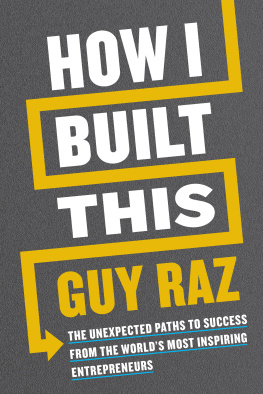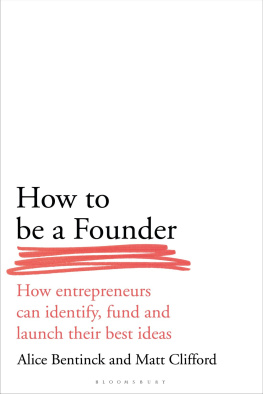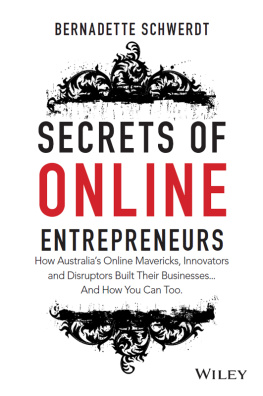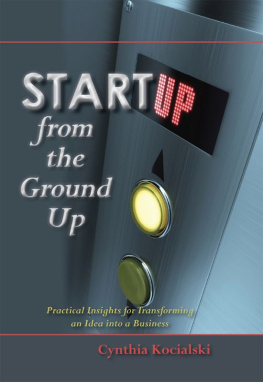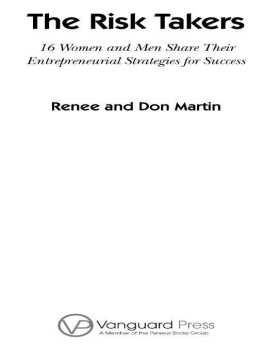Copyright 2020 by Guy Raz
All rights reserved
For information about permission to reproduce selections from this book, write to or to Permissions, Houghton Mifflin Harcourt Publishing Company, 3 Park Avenue, 19th Floor, New York, New York 10016.
hmhbooks.com
Library of Congress Cataloging-in-Publication Data
Names: Raz, Guy, author. | Parker, Nils, author.
Title: How I built this : the unexpected paths to success from the worlds most inspiring entrepreneurs / Guy Raz, with Nils Parker.
Description: Boston : Houghton Mifflin Harcourt, 2020. |
Includes bibliographical references and index.
Identifiers: LCCN 2019057804 (print) | LCCN 2019057805 (ebook) | ISBN 9780358216766 (hardback) | ISBN 9780358216780 (ebook) | ISBN 9780358424239 (trade paper) | ISBN 9780358424246 (hardback)
Subjects: LCSH: New business enterprises. | Entrepreneurship. | Success in business. | Businesspeople.
Classification: LCC HD62.5 .R395 2020 (print) | LCC HD62.5 (ebook) |
DDC 658.1/1dc23
LC record available at https://lccn.loc.gov/2019057804
LC ebook record available at https://lccn.loc.gov/2019057805
Cover design by Brian Moore
Author photograph Peter Prato
v1.0820
This book presents the ideas of its author and his interviewees. It is not intended to be a substitute for financial, legal, or other professional advice. The publisher and the author disclaim liability for any adverse effects resulting directly or indirectly from information contained in this book.
For builders and those dreaming of building.
Introduction
On an otherwise normal summer Monday in 2018, my wife, Hannah, returned home from her daily run with tears streaming down her cheeks. As she came into the kitchen of our Berkeley, California, home where I was making breakfast for our boys, she pulled the earbuds from her ears and said through deep breaths, Why didnt... you prepare me... for this episode?
That morning, the team at How I Built Thisthe business podcast I created and have hosted since September 2016released our most recent episode, about Stacy Brown and her company, Chicken Salad Chick. I had forgotten this was the episode airing that day because the lag time between an interview and its release is usually many months. What I had not forgotten was how much of an emotional roller coaster my interview with Stacy Brown was. And it was clear from Hannahs reaction that it had resulted in a very powerful episode. Heres the basic outline of the story:
Stacy starts making chicken salad out of her home in Auburn, Alabama, as a way to make ends meet after her husband walked out on her and their three children, all under the age of six. Her goal is to earn $500 a month to pay the bills.
She finds small-time success right away selling her chicken salad door-to-door for several months, until someone calls the health department on her. (Apparently making food out of an unlicensed kitchen and selling it in off-the-shelf storage containers, basically out of the back of your car, is, technically speaking, not legal.) In response, the health department shuts her down.
As this is happening, she enlists the help of a business-savvy family friend named Kevin Brown, who convinces her not to give up, but to double down and open a restaurant instead, in an 800-square-foot shack. The rent is $800 a month. So with his help, she does just that, and its successful, too. On their first day in business, they sell out of their chicken salad by 2 p.m.
The intensity of the business and their partnership brings Stacy and Kevin closer together. Eventually, they fall in love and get married. Now as partners in life and in business, they steadily grow Chicken Salad Chick and use the cash flow to open two additional locations in Auburn, since no bank will even give them the time of day, let alone a small-business loan.
After four or five years of bootstrapping their way to sustainability, they realize its time to find someone who can help them pivot to a franchise model where theyll have a shot at turning a real profit and taking some cash out of the business.
Unfortunately, they end up partnering with a less-than-honorable couple to whom they foolishly, in retrospect, sell 51 percent of the company, and who threaten to fire Stacy and Kevin from their own business just a few months later when the two couples visions for the future of Chicken Salad Chick diverge.
Unwilling to let go of all theyve built, Stacy and Kevin negotiate a buyoutexcept the partners want a 3 return on their initial investment, which amounts to $1.3 million(!), and they want it in thirty days(!!), or they are going to take over the company, and Stacy and Kevin will get nothing(!!!).
Needless to say, Stacy and Kevin dont have $1.3 million, so they travel all over Alabama pitching to anyone who will listen to them, trying desperately to raise the money. They get nowhere until the very last dayday 30 of thirtywhen a man named Earlon McWhorter, who made his money building Lowes Home Improvement stores, calls them up after attending their pitch meeting at the Auburn Chamber of Commerce and tells them that he believes in them, that he loves their chicken salad, and that he will write them a check for every penny they need.
Earlons investment doesnt just give Stacy and Kevin their company back; it propels them into a franchising model that catches fire immediately. They start opening stores all over the South. Everything is going amazingly well. And then, in the middle of their expansion, Kevin is diagnosed with stage 4 colon cancer that has metastasized to his liver. He immediately begins an aggressive chemotherapy treatment regimen and, astoundingly, never misses a single day of work.
Its the beginning of another fight. This one, tragically, they will not win. But that does not stop them. Not only do they continue growing Chicken Salad Chick, but they also start the Chicken Salad Chick Foundation to support colon cancer research. As part of their fundraising efforts, Kevin has the idea to put on a huge benefit concert at Auburn Universitys Jordan-Hare Stadium and to have Kenny Chesney (the biggest star in country music at the time) headline it. Its a crazy idea, but then so was a restaurant dedicated exclusively to chicken salad. He helped make that happen, so why not this?
Why not, indeed. They get Kenny Chesney. They sell 50,000 tickets. And on that night in April, they fill Jordan-Hare Stadium. Except Kevin will not be among the crowd, not in his physical form, at least. He passes away six months before, on November 21, 2015, surrounded by family.
For Stacy, its an unfathomably painful loss. One that comes after nearly a full decade of very high highs and incredibly low lows, in both her personal life and her professional life. And yet, Stacy, like her husband, continues fighting. She perseveres. Not just for herself and her children, but for the memory of what Kevin meant to her and to their business. Later that year, all of their effort is rewarded: Chicken Salad Chick is listed in the Inc. 5000 as one of the fastest-growing restaurant brands in America. Today, it is a $100 million business.
This tumultuous, inspiring story is, in many ways, a quintessential entrepreneurial story. Its also a classic heros journey. If youve ever read any Greek mythology or the Bible or watched Star Wars, you have experience with the heros journey, the conceptidentified by the author and philosopher Joseph Campbellthat most great epic stories follow a similar narrative arc: a hero has a crazy idea; people doubt her; she leaves the village to pursue her vision, faces untold obstacles, falls into an abyss, barely escapes death, but manages to come out the other side with whatever she was looking for and continues on her journey to an eventual triumphant return.

